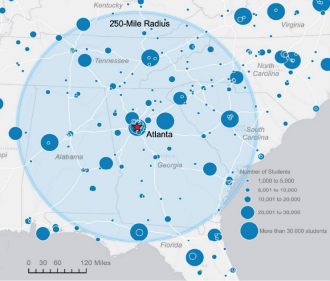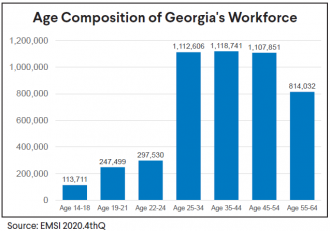Highly Skilled Labor Force
In order to accelerate the growth of the electric mobility industry in Georgia, EMIA has the goal to support the continuous supply of highly-educated talent and skilled workforce. It will work with representatives from the state’s universities, technical colleges and industry to identify workforce development needs for electric mobility related manufacturing, services and innovation.
college students
(U.S. average: 38.5)
between the ages 25 and 44
Turning Talent into a Renewable Resource

There are more than 2.2 million workers in Georgia who are between the ages of 25 and 44, representing nearly 44% of the state’s total employed workforce. With 33%* holding at least a bachelor’s degree and 41%* with an associate’s degree or higher, the state’s workforce is highly educated and predominate in technology, arts, business, and management fields. *(ESRI 2020)
In order to continue to fill the pipeline of skilled and professional talents, Georgia's colleges and universities train and educate almost 540,000 students a year. Initiatives like the HOPE scholarship and its far-reaching impact proves the state's commitment to increasing the caliber of education available in Georgia.
 The state makes impactful investments in students from Pre-K through high school, but it doesn’t stop there. Georgia keeps intellectual capital in-state through a top-notch college and university system. Several programs are offered to make post-secondary education attainable and affordable.
The state makes impactful investments in students from Pre-K through high school, but it doesn’t stop there. Georgia keeps intellectual capital in-state through a top-notch college and university system. Several programs are offered to make post-secondary education attainable and affordable.
Production, Business & Technology Workforce
As companies search for the prime location for their business, access to a dependable pipeline of talent is key. Georgia's partnership-driven approach to workforce development sets the state apart and ensures companies will be able to fill their critical staffing needs as Georgia’s universities equip their students with the in-demand skills needed to succeed. State-sponsored training facilities, top-notch educational programs, and nationally ranked colleges provide Georgia businesses with talent that enables them to achieve next-level success.

Georgia's HOPE Scholarship and Grant Programs
Georgia’s Helping Outstanding Pupils Educationally (HOPE) program is ranked No. 1 in the nation by the National Association of State Student Grant and Aid Programs. The HOPE scholarship and grant programs provide financial assistance to Georgia students pursuing undergraduate degrees or certificates at eligible Georgia public and private colleges and universities and technical colleges. HOPE has provided more than $11.2 billion in financial assistance to almost 2 million students for educational programs beyond high school since its inception in 1992. The HOPE Scholarship is a merit-based scholarship that covers up to 100% of the cost of tuition of Georgia residents who have demonstrated academic achievement. The HOPE Grant pays part of the tuition for students enrolled in a certificate program of study at eligible Georgia colleges and the HOPE Career Grant program supplements the HOPE Grant to provide free tuition for students preparing for occupations in high demand.

Georgia Quick Start
Georgia Quick Start is consistently ranked as the No. 1 workforce training program in the nation. Working directly with the employer, Quick Start develops and delivers fully customized, strategic workforce solutions for qualified companies investing in Georgia. Services are provided free of charge as a discretionary incentive for companies creating jobs within a broad range of industries. These discretionary, in-kind services are offered to new and expanding companies creating jobs across a range of industries. Quick Start customizes each training program to the specific project needs of the company. Services may include one or more of the following:
- Strategic workforce consultation
- Pre-employment assessment
- Customized post-employment and job-specific training
- Leadership and productivity enhancement training
College & Career Academies
Started in 2007, 50 statewide academies had more than 30,000 students enrolled in 2019.
To support the current and future needs of Georgia’s businesses, high school students across Georgia have access to training that builds their skills in high-demand areas. Always on the forefront of workforce development, Georgia was the first state in the country to adopt a career path requirement for all high school students. College and Career Academies allow high school students to get an early start on accredited college-level courses and technical certification programs through Georgia’s College and Career Academy Network. Each Academy is built through partnerships between a local school system, a technical college, and local business leaders to produce a long-term talent pipeline for the workforce needs specific to each community.
Technical College System of Georgia
22 colleges with 88 statewide campuses offer 600+ programs.
The Technical College System of Georgia (TCSG) is another vital resource to the state's diverse workforce. Throughout the state, these facilities are training and certifying students in relevant and in-demand trade skills. The economic development offices at each technical college ensure their local companies have the customized training they need to keep their employees’ skills up-to-date and cutting-edge. TCSG oversees the state’s public technical colleges, adult literacy programs, and a host of economic and workforce development programs, including the College and Career Academy Network and the Quick Start training program.
Colleges and Universities

Georgia offers one of the top talent pipelines for engineering in the country.


